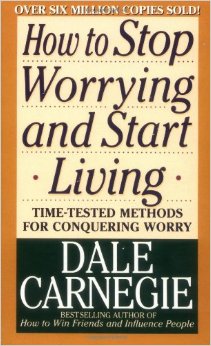
More than fifty years ago, the legendary Dale Carnegie wrote one of the biggest-selling motivational books of all time, How to Stop Worrying and Start Living. The book is a bit dated now, both in writing style and content, but many of the points Carnegie are as applicable today as they were then.
Carnegie focused a great deal on the acceptance of the inevitable as a key to eliminating stress and worry. Though I agree with him on this point to some extent, it’s a bit more complicated than he made it sound. The reason I say this is because what some people think of as inevitable, others see as a challenge that can be overcome.
For example, a person might believe that failure is inevitable for him and thus resign himself to a life of frustration. Unfortunately, this is precisely what millions of people do. Yet, the reality is that failure is not inevitable in anyone’s life.
But what about things that really can’t be changed, such as blindness and quadriplegia? Thousands of people have endured major physical handicaps, yet found the mental and physical strength to accomplish great things. By accepting the reality of their physical handicaps, such people were able to rise above their handicaps.
The challenge is to be able to determine what is and is not inevitable. When I use the word inevitable, I think of it in the future tense — as something that has not yet happened. Carnegie, however, seemed to be referring to the inevitable in the present tense. (It’s already a fact of life, so learn to accept it.) Thus, it could be that his oversimplification of the subject was simply a matter of semantics.
Technically speaking, the only thing that is 100 percent certain to occur in the future is death. Frank Sinatra expressed his view of this certainty with typical candor when said, “You better enjoy livin’ baby, ’cause dying is a pain in the ass.”
I wouldn’t exactly compare Sinatra to Shakespeare from a linguistic standpoint, but in reality he summed up perfectly the solution to dealing with the inevitability of death: Become so focused on life that you don’t have time to think about it.
When you direct your energy away from the inevitability of death, it paves the way for focusing on constructive living. The least expensive medication for worry and stress is activity.
While death stands alone as the one fact of life that is truly inevitable, many other things come close. Even so, none of them deserve your stress or worry.
So, yes, Dale Carnegie was right when he preached resignation of the inevitable, but it’s important to be able to differentiate between what is and is not inevitable. The reality is that most perceived problems can be overcome through a combination of (1) relentlessness, (2) resourcefulness, which opens the mind to new possibilities that people with a low awareness level cannot see, (3) the law of averages, and, above all, (4) being conscious of your connection to the Universal Power Source.
Any way you slice it, and whatever your spiritual beliefs may be, what it all boils down to is focusing on constructive thoughts that will better your existence and the existence of your loved ones. It’s okay to plan for the future, but worrying about the future can actually get in the way of sound planning.
Above all, exerting mental energy to worry about the inevitable is illogical. We’re all familiar with the Serenity Prayer, which includes the words: “God, grant me the serenity to accept the things I cannot change.” If something is truly inevitable, that means there is nothing you can do about it. And if there’s nothing you can do about it, what’s the point in worrying?
Just make certain that you don’t cavalierly apply the term inevitable to a situation that doesn’t warrant it. As I pointed out, very few things in life are inevitable, and only one — death — is 100 percent certain. And since, as Sinatra put it, death is “a pain in the ass,” why spend time thinking about it?
A better idea is to invest your mental and physical energy in thinking about how to be the best spouse you can possibly be, the best parent you can possibly be, the best son or daughter you can possibly be, the best sibling you can possibly be, the best friend you can possibly be, the best employee or employer you can possibly be, and the best overall person you can possibly be.
Which is more than enough to keep you busy. However, as a bonus, to the extent you are successful in these pursuits, that other little issue we worry so much about — financial success — somehow works itself out without your having to fret and stew about it.
